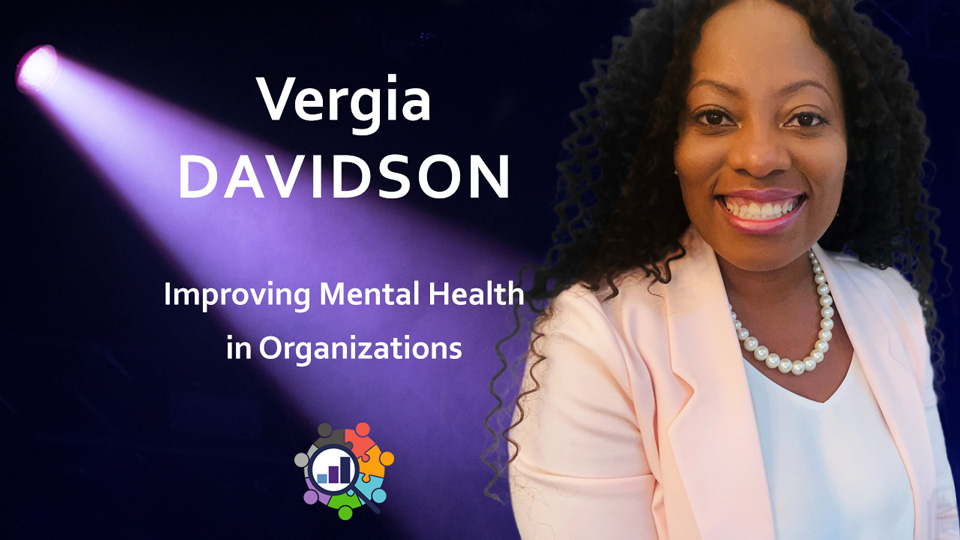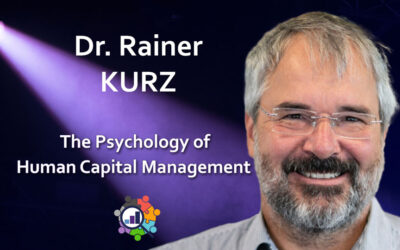A CykoMetrix Spotlight Production
Every week, the Spotlight shines on an amazing professional with a story to tell and lessons to teach. Welcome to the CykoMetrix Spotlight.
The following is an adapted transcript of the exchange between Sylvain Rochon, CMO at CykoMetrix as host, and Vergia Davidson, Mental Health Consultant & Registered Psychotherapist (See strivementalhealth.ca )
Sylvain Rochon: Welcome to CykoMetrix Spotlight. My name is Sylvain Rochon, I’m the Chief Marketing Officer at CykoMetrix. It’s a SaaS-based psychometric assessment platform that caters to clients from all over the world. All assessments are in one spot, in a marketplace where you can divvy out assessments to your team, to a client’s team so that you can do continuous development and improve productivity and culture, all sorts of nice stuff inside our organizations.
Today, in the CykoMetrix Spotlight, we have Vergia Davidson. Vergia is a Mental Health consultant and registered psychotherapist. I think, our first in the series. She’s the founder and CEO of STRiVE mental health wellness and empowerment, for over 10 years. Vergia Davidson has been seeking to make a difference, one life at a time, through psychoeducation strategy development and counseling. As a mental health consultant, she specializes in helping organizations retain top performers by increasing psychological safety. Her greatest passion is to bring healing through creating safe spaces. Welcome to the spotlight Vergia.
Vergia Davidson: Thank you. So glad to be here.
Sylvain: This is very exciting. Most of the people that come on the spotlight are from varied areas, like India, South Africa, they do all sorts of work but you live here in my city, in Ottawa and that’s unusual and it’s very exciting. That means we can actually physically meet one day. It’s because we can actually go out.
But- and I think the other piece of the excitement, perhaps even more exciting, is that we’re going to be talking about mental health. You are a specialist in that field and we’ve got just gone through two years of health discussions and mandates and all sorts of stuff. We haven’t heard a whole lot about mental health over the last couple of years either. I think it’s really important to talk about this, not necessarily fully in the context of COVID, but generally speaking inside organizations. How do you improve mental health in organizations because COVID is, well, we’re going to look at it in the rearview mirror, but you still have mental health considerations inside workplaces and at home. So why don’t you tell us a little bit about your thoughts? Well, let’s jump into COVID to start because why not since I just mentioned it. What are your thoughts regarding mental health issues coming out of the pandemic?
Vergia: Yes, mental health has never been more of a hot topic, especially coming out of the pandemic, because we are now transitioning, but not back to what was normal, but kind of what the new normal is. So, there’s a lot of transition. Therefore, there’s a lot of anxiety, there’s a lot of people being divided, “I want to go back to in person”, and then others are like, “I want to stay home”. So, when it comes to mental health, definitely there’s a lot of people experiencing anxiety, depression, and just really the fear of the unknown. So that’s really something that I hear a lot from managers and employees that just wonder what it’s going to look like.
Sylvain: Yeah, and there’s this transition like you said from office to do homework, hybrid models and now going back after the pandemic, there’s a variety of different models in the office. All right. It depends on the business and the owners, all sorts of variations, and people have different feelings about how that changes their lifestyle.
So, how do you deal, as a consultant, with the disjointed way that businesses now operate with hybrid models, with the two days at work and three days at home, and all these different models. How can you even operate to diagnose, not diagnose, but to help the people wherever they are?
Vergia: That’s a really great question and the first word that comes to mind is flexibility because each person is so different. We’re talking about mental health right now, right? So, what I need for my safety or for me to feel well, or to be well, or to be productive, might be different from my colleague. So, I really help employers to really take the time to learn how to listen to what their employees need. Get the feedback and also apply it. Because it might be that someone needs a later start time, or maybe someone needs a little bit more time or less time here and being flexible with breaks. Things like that is really helpful.
But the number one thing I would always recommend is modeling. If you’re not modeling balance, if you’re not modeling that flexibility, then it’s hard for your team or other people to say, “hey, you know what, I can take a mental health day”, or, maybe advocate for myself to say, “early mornings don’t really work as well as maybe later mornings for meetings” or whatever it might be.
Sylvain: So, and that’s really awesome. I’m thinking now that, this is kind of the employee empowered to express themselves at least from what you’re saying here. I’m wondering, how are the employers responding when you make these suggestions? When you– and also when you illustrate that this would be for the benefit of your business. If you allow some of these concessions and things– what is their reaction like?
Vergia: So, some might be hesitant because they’re like, “well we’re on the job and if we’re flexible and we make these concessions, how are we going to be productive?” So, I basically show them what the research says, and when they see the burnout rates, when they see lack of productivity, and it’s costing them a lot, then they’re like, wait a minute, maybe I should hear this. Or the other thing is, just giving them practical tools that they can use. For example, if you notice that you work in a busy environment, you can’t really stop and disconnect. Maybe just changing the activity. Maybe making meetings a little bit less longer than it was before.
These practical things, when employers see that, “hey, it’s possible. It’s not a huge ordeal that I have to change everything”, they become more onboard. What’s really common now, is they’re really advocating for mental health professionals to come and talk to the people and be a representative for them. So, pretty awesome.
Sylvain: It sounds good. What about the stigma of mental health? Because I know that’s it’s a bad word for a lot of people. Mental health means there’s a problem, like a personal problem with that person. How is that changing over time? Or is it changing? Is it improving?
Vergia: So, I would say, unfortunately, stigma is around and a lot of people fear, especially in the workplace, that it’s going to affect their year-end review or their relationship with other people. If they let them know that, maybe they’re struggling a little bit. So, there is a huge stigma there.
It is changing where employers are advocating for different resources, giving employees, the ability to know that, hey, they have different options out there. But I would say they’re still that hesitation with, will this be tied to my work? And this is where the modeling comes into play from managers. So, then you can model that, it’s okay to struggle with mental health, you can have off days but it doesn’t define you.
Sylvain: I think that’s excellent. Well, you’re the expert, I’m not in the field, I don’t really know what’s really happening. That’s why I’m asking the questions. Something else comes to mind regarding process. It seems to me there’s a lot of additional complexity, not only because of where the person’s work comes in and out and that kind of situation, which is, a management issue, of course. But then you have to manage all these other little details on an individual level, based on how people feel.
It seems very granular that each individual has different needs and the manager has to manage all that. So, is there a tool available that allows them to monitor all this stuff and give visibility to individual needs? Are you suggesting such a tool? Can you tell me about that?
Vergia: Yeah. So, there’s different tools online from the Mental Health Standard, and they have a lot of tools, surveys, to check in what your mental health is right now, if you want to increase the safety. When I talk about safety or psychological safety, I’m talking about your employees feeling comfortable enough to speak up without consequence of them speaking up.
So, it shows you practically a lot of tools that you can use on a day-to-day basis.
Sylvain: Okay, good. I did not know that. What about predicting? We’re an assessment company in psychometric assessments, and we know from research, you can layout a psychometric assessment to determine who’s prone to become anxious, and other self-assessments and things like that. Is that a way for managers to perhaps, identify- I want to say weaknesses, but I don’t really like the word, but where you may have some crunch points to prevent, the anxiety to appear for example, or to prevent certain situations? Is that also a common practice to use these predictive assessments?
Vergia: So, it’s predictive but also, humans are so different. So, I wouldn’t say, only use this as an indicator, these assessments that you can get from the standard or from other resources. I would say get to know your employees. I know it’s very simple, but by getting to know them, you get to know what areas of growth they need. Because as a leader, your number one role, is to try to strengthen those areas of growth, right? And give practical advice on what to do. So, use those things to inform your decisions, but don’t let it remain there, because every two people are very different.
Sylvain: True. Here’s another question that [inaudible] and inspired from another interview I did recently, that was specifically talking about diversity in the workplace, and the stress is related to diversity. Diversity being, actually a powerful method for most businesses to actually do better, to improve, to be more productive. But at the same time, it adds some stresses within teams because of misunderstandings and biases, and whatnot. So how does this, in government and other institutions, this drive to have a diverse work environment, work with or kind of play with mental health issues? Versus a homogeneous environment? which is probably less stressful I suppose. So how do you see diversity and mental health kind of working together?
Vergia: No. I think diversity and mental health, they go hand in hand. They have elements that are the same, but they have elements that are different. I always suggest if you have diversity issues, identify someone that’s a specialist in that area, because they’re looking from that blend. But when we look at mental health and diversity, because people are so different, trigger points can vary. There could be a landmine of possible trigger points without even you knowing. So, I would again say, don’t be afraid to ask, to see what the culture is, what they like to do, what they don’t like to do, and then be mindful of that. Don’t take yourself so seriously, that my environment needs to be like this, and this is what I do.
In some cultures, just looking at a person in the eye could be very disrespectful and very nerve-racking, whereas maybe in other cultures they would perceive this as very rude. You’re not. You don’t even have the decency to look me in the eye, right? Where in another culture it might be a sign of respect that I’m not looking at you in the eye. So, this simple example can mean so many different things to different people.
So, diversity is important but take the time to ask, and if you’re unsure of how to ask, then is there a colleague that maybe you can talk with that in confidence or a manager that you can talk with, to understand a little bit more? This is where I also come in. I see a lot of clients find it hard to bring up these issues. So, we work on assertiveness and manage those fears when it comes to people pleasing or whatever it might be.
Sylvain: Excellent. So, from the manager point of view, who needs to be aware of mental health and manage staff and take care of everything that we talked about. Clearly, what they need to do is call you, right? To set up their processes, to kind of figure stuff out, because they may not have the experience and they want to do a good job managing their staff. So, I think that’s somewhat clear.
But what about the employee who is on the receiving end, essentially whatever the manager decides. What would be your recommendation for the employee, that sees something that may be brewing or maybe doesn’t want to expose him or herself to stigma around mental health, and may need some help? What do you recommend to the individual that sees a need? What do you think?
Vergia: Interesting question, because there’s a lot of people that are seeing things, but they’re afraid to speak up or they don’t want to stir the pot, especially within the workplace. So, the first thing I would do is ask that person to reflect. What’s going on inside of them? What’s triggering for them? What do they want? What’s their ideal outcome in this? Because sometimes if we don’t take the time to reflect, our answer– like the answers that we get, might trigger us.
So, it’s important that we’re at the place where, if we are going to bring this up, we figure out what exactly is it that I feel, and my response or the other person’s response to me might be two folds. They might agree with me, or they might not see it. Then the second thing is, don’t keep it to yourself. Is there someone within the team or someone that you’re close to, even within the community, they can talk about it. Because sometimes, we need to just get our thoughts out and make it make sense and take good care of yourself. When we’re seeing things happen and it doesn’t feel too comfortable to us, it’s important that we take care of our own well-being. Really what mental health is, is our ability to face stressors in our lives and we feel like we can overcome it. We can interact with the community around us. We can access to supports when you need it.
So a huge part of the employee’s well-being, is don’t neglect to take care of yourself. Whether it’s going for that walk or whether it’s checking in with someone that you haven’t seen in a while. Whatever it is, take good care of yourself. If you have a good relationship with a manager or supervisor, start there, once you feel comfortable, start there and have the conversation, and if you feel like, I can’t have the conversation “Vergia, that’s a little bit too much.” Then maybe find an article that similar and say, “hey, I saw this, what do you think about this?” and then use this as kind of a third-party bridge to get the conversation rolling.
Sylvain: That’s very clever. I like that last part. It’s not me, it’s your article. Excellent advice. Mental health is part of our global health. Our mind is part of our body, right? So, we shouldn’t be ashamed of it. Sometimes our body gets sick. Sometimes that part is the organ we call the brain, and we need to find a way to heal it. I know a bunch of family members that aren’t afraid to tell me about all their physical ailments. So, we should be quite okay, talking about our mental condition at any point in time.
I think this is great advice. It was amazing having you here. I’m so glad we were able to talk about mental health in the workplace. It’s so important. And like you said, it’s often whispered where it should be an open conversation. It’s part of being healthy. So, people that are watching this or reading about this in this interview, contact STRiVE, contact Vergia for some help and support, she’s brilliant. Then make sure you have a good mental health at work. Thank you so much.
Vergia: Thank you.
Vergia Davidson – strivementalhealth.ca
Founder/CEO of STRiVE: Mental Health, Wellness, and Empowerment.
For over ten years, Vergia Davidson has been seeking to make a difference one life at a time through psychoeducation, strategy development, and counselling.
As a Mental Health Consultant, she specializes in helping organizations retain top performers by increasing psychological safety. Her greatest passion is to bring healing through creating safe spaces.
Vergia graduated from the University of Ottawa/ Saint Paul University in 2012 with a MA in Counselling. After graduating, she became a registered psychotherapist and completed a MSc in Project Management from the University of Salford (UK, 2020).
Vergia has helped co-create many programs within the community (Mental Health Frameworks, Leadership Workshops & Mental Health Training, and Culturally Sensitive Discussions).
As a scientist-practitioner, she has a significant commitment to evidence-based practice both as a clinical therapist and researcher.
About CykoMetrix – www.CykoMetrix.com
CykoMetrix is a leading edge combinatorial psychometric and human data analytics company that brings the employee assessment industry to the cloud, with instant assessments, in-depth analysis, trait measurements, and team-based reporting features that simplify informed decision-making around recruiting, training, and managing today’s modern workplace.



